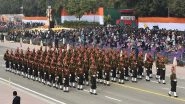Washington, Mar 3 (PTI) Seeking to comprehensively overhaul the H-1B and L-1 visa programmes, a bipartisan group of influential senators have introduced a legislation in the US Senate, which they argued will protect American workers and crack down on foreign outsourcing companies that exploit these popular visa programmes to deprive qualified Americans of high-skilled jobs.
The H-1B visa is a non-immigrant visa that allows US companies to employ foreign workers in speciality occupations that require theoretical or technical expertise. Technology companies depend on it to hire tens of thousands of employees each year from countries like India and China.
Also Read | Russia-Ukraine War: 2 Explosions Heard Near Kyiv’s Druzhby Narodiv Metro Station in Ukraine.
The H-1B visa programme is the most sought-after work visa among foreign professionals, including Indians. The L-1 visa is a non-immigrant visa for the purpose of work in L-1 status. It is valid for a relatively short amount of time.
The H-1B and L-1 Visa Reform Act will reduce fraud and abuse, provide protections for American workers and visa holders, and require more transparency in the recruitment of foreign workers, the senators said.
Also Read | China To Maintain Normal Trade Relations With Russia Despite International Sanctions.
Introduced by Senate Majority Whip Dick Durbin, Chair of the Senate Judiciary Committee, and Senator Chuck Grassley, Ranking Member of the Senate Judiciary Committee, the legislation is co-sponsored by Senators Richard Blumenthal, Tommy Tuberville, Sherrod Brown, Bill Hagerty, and Bernie Sanders.
The H-1B and L-1 Visa Reform Act will require US Citizenship and Immigration Services to prioritise for the first time the annual allocation of H-1B visas. The new system would ensure that the best and brightest STEM advanced degree students educated in the United States receive preference for an H-1B visa, and also prioritise other US advanced degree holders, those being paid a high wage, and those with valuable skills.
STEM stands for Science, Technology, Engineering, and Mathematics.
The legislation explicitly prohibits the replacement of American workers by H-1B or L-1 visa holders and clarifies that the working conditions of similarly employed American workers may not be adversely affected by the hiring of an H-1B worker, including H-1B workers who have been placed by another employer at the American worker's worksite, a media release said.
“Reforming the H-1B and L-1 visa programmes is a critical component to fixing America's broken immigration system,” Durbin said. “For years, outsourcing companies have used legal loopholes to displace qualified American workers, exploit foreign workers, and facilitate the outsourcing of American jobs. Our legislation would fix these broken programmes, protect workers, and put an end to these abuses,” he said.
“Congress created the H-1B and L-1 visa programmes to complement America's high-skilled workforce, not replace it. Unfortunately, some companies are trying to exploit the programmes by cutting American workers for cheaper labour. We need programmes dedicated to putting American workers first,” Grassley said.
“When skilled foreign workers are needed to meet the demands of our labour market, we must also ensure that visa applicants who honed their skills at American colleges and universities are a priority over the importation of more foreign workers. Our bill takes steps to ensure that the programmes work for Americans and skilled foreign workers alike,” he added.
According to the senators, the legislation will target outsourcing companies that import large numbers of H-1B and L-1 workers for temporary training purposes only to send the workers back to their home countries to do the same job.
Specifically, the bill would prohibit companies with more than 50 employees, of which at least half are H-1B or L-1 holders, from hiring additional H-1B employees. The bill gives the US Department of Labor enhanced authority to review, investigate, and audit employer compliance with programme requirements, as well as to penalise fraudulent or abusive conduct.
It requires the production of extensive statistical data about the H-1B and L-1 programmes, including wage data, worker education levels, place of employment, and gender.
In addition, the H-1B and L-1 Visa Reform Act includes several reforms of the L-1 visa programme, including the establishment of a wage floor for L-1 workers; authority for the US Department of Homeland Security to investigate, audit, and enforce compliance with the L-1 programme requirements; assurance that intra-company transfers occur between legitimate branches of a company and do not involve “shell” facilities; and a change to the definition of “specialized knowledge” to ensure that L-1 visas are reserved only for truly key personnel, the media release said.
“This legislation will crackdown on the manipulation of existing vulnerabilities to ensure employers prioritize the American worker before considering any high-skilled foreign applicants. If we are going to get our economy back up and running, we need to do it correctly and that begins with utilizing the talent we have here at home first and foremost,” said Senator Tuberville.
US Citizenship and Immigration Services (USCIS) on Monday announced that it has received a sufficient number of petitions needed to reach the congressionally mandated 65,000 H-1B visa regular cap and the 20,000 H-1B visa US advanced degree exemption, known as the master's cap, for fiscal year (FY) 2022.
(The above story is verified and authored by Press Trust of India (PTI) staff. PTI, India’s premier news agency, employs more than 400 journalists and 500 stringers to cover almost every district and small town in India.. The views appearing in the above post do not reflect the opinions of LatestLY)













 Quickly
Quickly


